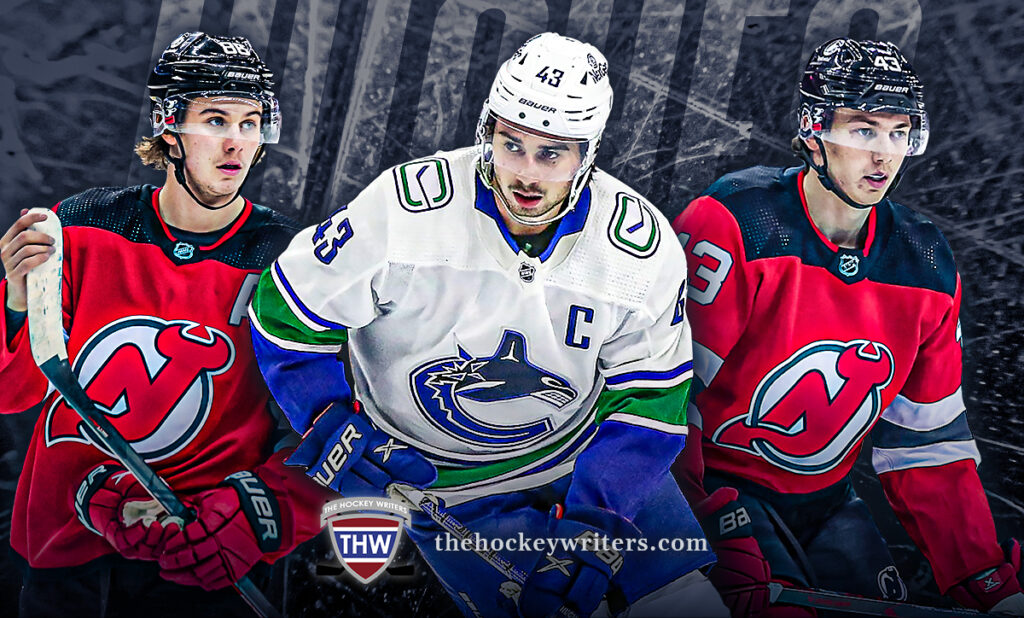The air in the hockey world is thick with anticipation. While teams are fine-tuning their systems and players are getting into mid-season form, some compelling drama is unfolding off the ice. The league’s landscape is being shaped not by slap shots and body checks, but by contract negotiations, personal revelations, and the ever-present pressure cooker of a Canadian market. Let’s dive into this week’s whispers and roars of the NHL rumor mill.
Marner’s Exit and the Brutality of the Leafs’ Spotlight
The blockbuster trade that sent Mitch Marner to the Vegas Golden Knights was, on the surface, a hockey deal. A star player leaves a perpetually underachieving contender for a recent champion. But the real story, the one that should send a chill down the spine of the league, has little to do with X’s and O’s. In a candid, bombshell interview with TSN’s Mark Masters, Marner pulled back the curtain on a horrifying reality for his family: targeted harassment, doxxed personal information, and even death threats.

This wasn’t just the garden-variety criticism that comes with a multi-million-dollar contract in a hockey-mad city. According to Marner, the situation escalated to the point where his family was forced to hire full-time security following another crushing playoff collapse. This wasn’t about accountability; it was about safety. It’s a revelation that reframes his entire departure from the Toronto Maple Leafs.
Also on the EDGE – Which Maple Leafs Will Answer the Bell in the Post-Marner Era?
The move, which culminated in a massive eight-year, $96 million contract with the Golden Knights, wasn’t his only option. Marner revealed he had vetoed a potential trade to Carolina, a decision driven by the fact his wife was pregnant at the time. The thought of her navigating a move and a new city alone while he was on the road was a non-starter. This adds a deeply human element to a transaction often viewed through the cold lens of assets and cap hits.
Unsurprisingly, the Toronto fanbase is fractured. One camp sees Marner’s explanation as a deflection, a way to avoid taking responsibility for on-ice performance that rarely matched his regular-season brilliance. The other, however, views it as a damning indictment of the market’s toxicity. For them, the Marner saga is a glaring red flag, a cautionary tale for any elite free agent considering Toronto. They argue that if a hometown kid who bled blue and white can be run out of town under such distressing circumstances, who in their right mind would willingly sign up for that? The debate rages on, but one thing is clear: the fallout from Marner’s departure will linger over the Maple Leafs organization for a long time.
Is Goaltending the Price of McDavid’s Extension?
Meanwhile, a few provinces over, another generational talent is facing a franchise-altering decision. The countdown on Connor McDavid’s contract has begun, and every tick of the clock in Edmonton sounds like a thunderclap. McDavid has been clear about his immediate goal: winning the Stanley Cup this season. But when pressed on his long-term future, his words—”all options were on the table”—were carefully chosen and sent shockwaves through the hockey world. He intends to take his time, to evaluate everything.
The subtext here is deafening. As Elliotte Friedman suggested, McDavid sees something “imperfect” with the Oilers’ construction. You don’t need to be an NHL insider to pinpoint the likely culprit: the crease. Stuart Skinner has shown flashes of brilliance but has yet to prove he can backstop a team through four grueling playoff rounds. Behind him, Calvin Pickard is a serviceable backup, not a 1B solution. The question hanging over the Oilers is whether their current goaltending tandem is good enough to win a championship. The prevailing wisdom suggests it isn’t.


This puts GM Stan Bowman in an unenviable position. James Mirtle of The Athletic noted the Oilers would need to “get creative” to find an upgrade, a prerequisite many believe is necessary for McDavid to put pen to paper on an extension. The market, however, is barren. Are there clear, undeniable upgrades available? Not really. Could a team like Detroit make John Gibson or Cam Talbot available if their season goes south? Perhaps, but are they the answer? Top prospect Sebastian Cossa looms, but he’s not a short-term solution. Other names like Tristan Jarry or Elvis Merzlikins come with their own significant risks and acquisition costs. Finding a true, championship-caliber goalie will require a bold, and likely unexpected, move.
Also on the EDGE – What’s the McDavid Holdup, and What’s the Payday Gonna Be?
The longer McDavid waits, the more the speculation will metastasize. If he were to hit the open market, only a handful of clubs possess both the legitimate Stanley Cup aspirations and the requisite cap space to make a serious run. Teams like Dallas (with a projected $27.9M+ in space), Tampa Bay ($27.75M), and Colorado ($26.85M) are licking their chops. Even Toronto, despite its own issues, could clear over $24.8M. The pressure is squarely on the Oilers’ front office. Fix the imperfection, or risk watching the best player on the planet walk away for nothing.
Hughes Brothers’ Contract Chess Match With the Devils
In New Jersey, a different kind of contract drama is playing out, one centered on family strategy and long-term leverage. Restricted free agent defenseman Luke Hughes, a cornerstone of the Devils’ future, is at an impasse with the team over the term of his second contract. This isn’t your typical squabble over a few hundred thousand dollars. It’s a calculated chess match.
Hughes’ camp, led by a savvy agent, is pushing for a five-year deal. The Devils, logically, would prefer either a cost-controlled, three-year bridge deal or a full eight-year maximum extension that buys up valuable unrestricted free agent years. The five-year term is the sticking point, and the reason is brilliant in its simplicity: it would allow Luke’s contract to expire at the same time as his superstar brother, Jack Hughes.

Jack signed an eight-year, $64 million deal back in 2021. A five-year pact for Luke would position both brothers to become unrestricted free agents heading into the 2030-31 season. The potential leverage this would grant the Hughes family is immense. They could negotiate as a package deal, either with New Jersey or on the open market, forcing any interested team to accommodate two franchise talents simultaneously. It’s a power play designed to maximize their earnings and control their collective destiny nearly a decade from now. For the Devils, it’s a dangerous precedent that could put them in an incredibly vulnerable negotiating position down the road. This standoff is a fascinating glimpse into the modern dynamics of player empowerment and agent strategy.
Reconstruction Zone: Chicago’s Defensive Overhaul
Finally, in Chicago, the rebuild continues at a feverish pace. With a generational talent in Connor Bedard secured up front, the focus has shifted to the back end. According to Bleacher Report’s Frank Seravalli, the Blackhawks aren’t just looking for a piece or two; they’re looking for a complete overhaul. Seravalli believes Chicago is in the market for “nine to ten legitimate, realistic NHL defensemen.”
Read that again. Nine to ten. That number implies that almost no one on the current blue line is safe and that GM Kyle Davidson is preparing to gut the entire defensive corps and start from scratch. It’s a clear signal that the Blackhawks are accelerating their timeline and understand that you can’t build a contender on the back of a single superstar forward. A strong, deep, and mobile defense is non-negotiable in today’s NHL. While the specific targets remain unclear, the message is not: Chicago is open for business, and a flurry of moves on their blue line seems not just likely, but inevitable.
Created with the aid of Gemini AI
